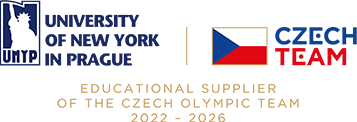Understanding Racial Theories: A Discussion with Dr. Brandon on his New Book

At a time when conversations about race and science are resurging, the work of Dr. Mark Andrew Brandon, a professor at the University of New York in Prague, stands out. Dr Brandon’s new book, “The Perils of Race-Thinking”, critically examines the life and ideologies of Aleš Hrdlička (1869-1943), a 20th-century anthropologist with controversial views on race. Dr. Brandon’s exploration of Hrdlička’s work serves as a timely reminder of the dangers of mixing scientific authority with racial bias.
In this exclusive interview, Dr. Brandon discusses his research, its implications for today’s debates on race, and the ways in which this work enriches his teaching at UNYP.
Dr. Brandon, could you elaborate on the central argument of “The Perils of Race-Thinking”? What do you hope to accomplish by bringing Aleš Hrdlička’s racial ideology into contemporary discussions?
My primary aim for the book is to make everybody uncomfortable with Aleš Hrdlička. Most people will agree with me that his beliefs about race were abhorrent, but it is far too easy to simply dump him into the category of racist (which he was) and smugly dismiss him as a “pseudoscientist”. Hrdlička was not a phony scientist; he was a pillar of the establishment scientific community, and an internationally-recognized expert in his field. He was the lead anthropologist at the prestigious Smithsonian Institution for over three decades. He believed that science could save humanity from the ignorance of religion and superstition. In many respects, Hrdlička was just the kind of person that we might trust today as a scientific authority. At the same time, he explicitly believed in the superiority of the White race. I want my readers to confront the historical reality that his racial thinking was perilous because it seemed so smart and scientific, not because it sounded crazy.
Your book presents a new perspective by focusing on Czech nationalism in Hrdlička’s racial thinking. Could you explain why this angle is significant, and how it affects our understanding of his work?
Although he was a Czech immigrant, practically all the scholarship about Hrdlička is written from an American perspective, and focuses on his role in the United States. I respect this, because Hrdlička was one of America’s premier anthropologists, and the American race story is hugely important and needs to be discussed. However, I decided to focus on his considerable Czech-language writings, from which a different story emerged. I have expanded our understanding of Hrdlička by arguing that his Czechness was central to his understanding of the world, and the starting point for his racial views. My map of Hrdlička’s racial world is original because it starts in Central Europe and ends in the United States, not the other way around.
In your research, you deconstruct the “science” behind Hrdlička’s racial ideology. What were the most striking findings that you believe deserve public attention?
In the archive, I found many letters to Hrdlička from people who wanted to know if there was a precise scientific methodology for telling if an ambiguous-looking person was really Black, White, or Native American. Some people even wanted to know if there was a racial blood test. In the United States, it was important to classify people definitively (for example in court proceedings) because racial categories were written into the law. People who did not fit clearly into a category, and I think there were a lot of them, presented a problem. Hrdlička was America’s top physical anthropologist, so people assumed he could solve the problem scientifically. He played his part and issued authoritative-sounding race verdicts, but I can see no evidence that he had any repeatable and rational methodology for his conclusions. I argue that he was practicing “racial divination” which was sanctioned by his aura of scientific prestige.
Given the contemporary resurgence of eugenics and scientific racism, how does your book serve as a tool for combating these dangerous ideologies?
I have thought about this a lot. I have many ideas, but I will give you a concise and partial answer. My own conclusion is that race always has been and still is a very bad idea, and that the only escape from this disastrous idea is a liberal conception of civil rights for all citizens guaranteed constitutionally by the state. I think Hrdlička’s worldview, when acted out in real life in the twentieth century, undermined this liberal understanding of citizenship and civil rights, with terrible results in both Europe and the United States. My book is one piece of that story.
The book mentions “transnational racial presumptions” behind the worst crimes of the 20th century. Could you elaborate on this connection? Why it is important for readers to understand it?
This is exactly where Hrdlička makes us very uncomfortable. When we hear about his racist beliefs and his sympathy for eugenics, we reflexively lump him together with the Nazis. I argue that he shared certain foundational beliefs with them, but was he a Nazi himself? No way! Hrdlička was proudly Czech, and he hated the Nazis. He also hated Nazi anti-Semitism, and said so in radio speeches and press interviews. He was on the “good” side in the struggle against Nazi racism, but does this certify him as a crusader against racism in general? Again, no way! Somewhat like his Nazi enemies, Hrdlička also believed that Slavs and Germans were engaged in a thousand-year racial struggle. He also unquestionably believed in the racial superiority of Whites, especially over Blacks, and he stated this openly and clearly on innumerable occasions. His intellectual profile does not fit easily into the comfortable contemporary “good” and “bad” categories that people today like to impose upon people in the past.
Do you plan to incorporate any themes or lessons from your book into your teaching curriculum at the University of New York in Prague?
I see no clear distinction between my research and my teaching. First, my teaching has always prompted my research interests. The classroom is a great place to formulate new ideas, and practice presenting them in a coherent way. I learn a lot from my students, who often ask interesting questions and make inciteful comments. Second, my research always comes back to the classroom, sooner or later. As a teacher, it has always been important to me to not only repeat the current “textbook consensus” but offer my students some original and creative ideas. I really want to give them something they will not hear anywhere else. This standard is hard to live up to, but doing innovative research and figuring out how to bring it back to the classroom is the only possible way to accomplish it.
UNYP Chronicle Newsletter
The e-mail address you provide will be used only to send you the newsletter. Your privacy is important to us.

Contacts
University of New York in Prague
Londýnská 41, 120 00 Praha
ID no: 25676598
Phone:
+420 224 221 261
Email: unyp@unyp.cz









